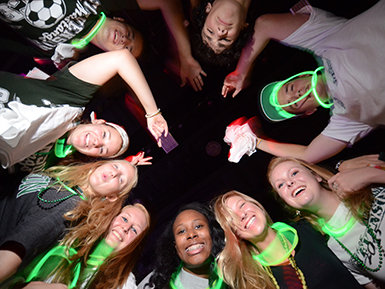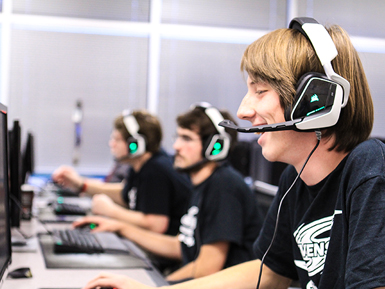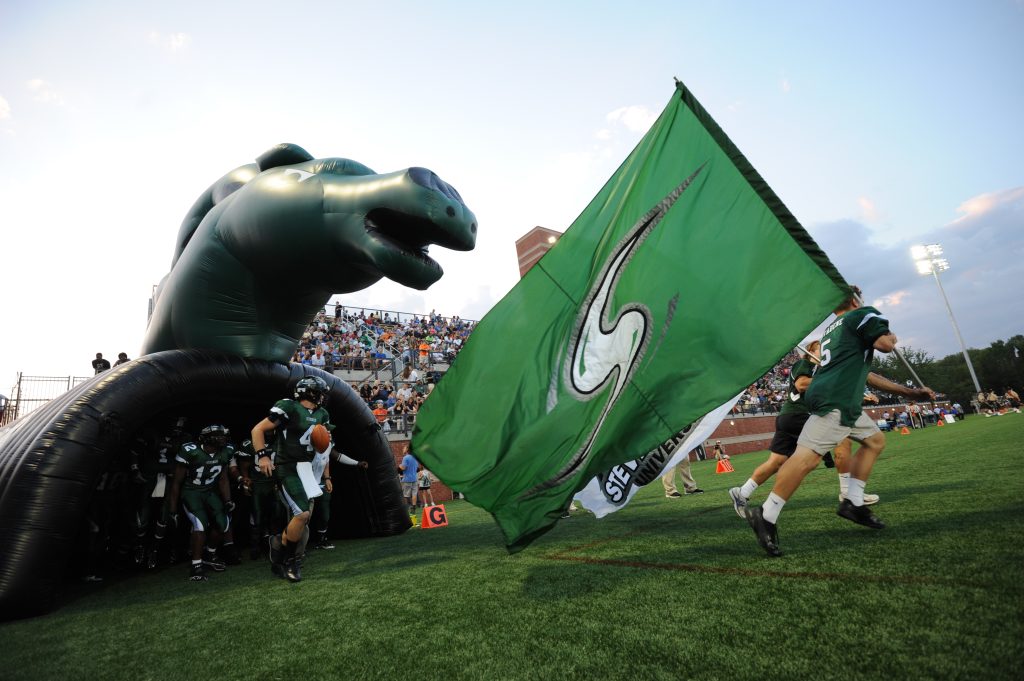Stevenson University defines academic misconduct as behavior that violates the principles and expectations of academic integrity. Such misconduct betrays the bonds of trust, disrespects honest endeavors, and undermines the teaching and learning process for every member of the academic community.
Examples of Academic Misconduct
Academic misconduct includes, but is not limited to, the following behaviors that violate academic integrity. This list of examples and definitions is representative but not all-inclusive.
- Cheating. Cheating means any behavior that attempts to undermine an instructor’s efforts to assess learning. Using or creating unauthorized materials or methods to complete a test, quiz, examination, assignment, or other assessment is cheating. Giving unauthorized assistance to other students also constitutes cheating.
- Collusion. Collusion occurs when two or more students conspire to subvert the learning process, particularly with regard to the instructor’s efforts to assess learning outcomes. Collusion, as opposed to authorized collaboration, creates unfair advantage for those engaged in the behavior.
- Fabrication. Fabrication is understood to mean the presentation of false data, sources, or research for academic credit.
- Multiple Submissions. The presentation of the same work, in whole or in part, for credit without the explicit permission of all interested instructors represents a violation of academic integrity.
- Plagiarism. Plagiarism is the act of representing the words, ideas, research, or works of another as one’s own. Plagiarism can involve submitting work prepared entirely or in part by another person or commercial service or borrowing material as direct quotation, partial quotation, or paraphrase from published or unpublished sources without proper acknowledgement. Students must appropriately document all print, online, and oral sources they use to complete assignments.
- Unauthorized Assistance. Unauthorized assistance is understood to mean accepting the help of another person in completing an assignment for assessment without the instructor’s express permission. Allowing another person, such as a tutor, to alter or revise an assignment beyond the scope of collaboration defined by the instructor also constitutes misconduct.
- Other Violations. There are many other examples of behaviors that constitute academic misconduct or violations of academic integrity. They include, but are not limited to, lying, forgery, bribery, damaging or stealing another’s academic property, and violation of professional standards.
A student who is not certain about whether or not a behavior violates the Academic Integrity Policy (i.e., constitutes academic misconduct) has the personal responsibility to check with the faculty member in advance. The University shall have the sole discretion to determine whether an alleged violation of University policy or procedure is to be handled under the Academic Misconduct Policy or under other policies of the University.
Procedures for Handling Academic Misconduct
Stevenson University expects members of the community to report observances of possible academic misconduct. Faculty should use the online reporting tool in WebXpress to report possible instances. Staff should report to the Academic Integrity Officer (AIO) who will submit a report on their behalf. Students who observe possible academic misconduct should contact a faculty member, a staff member, or the Academic Integrity Officer.
The following formal procedures apply to cases of reported academic misconduct and are intended to provide fairness to all parties.
Step 1: Report of Academic Misconduct
Upon discovery of academic misconduct, the faculty member or other agent of the University will complete an Academic Misconduct Report form, generally within two (2) business days of the discovery. The faculty member or other agent will submit the Academic Misconduct Report form via WebXpress. A copy of the Academic Misconduct Report will be sent to the student with a copy to the faculty member’s immediate supervisor and the Academic Integrity Officer. At the faculty member’s discretion, an informal meeting between the faculty member and the student may be held prior to submitting the Academic Misconduct Report form. The faculty member’s immediate supervisor is understood to be the Program Coordinator (PC), Department Chair (DC), Associate Dean (AD), or School Dean (SD) (referred to as “Supervisor”) to whom the faculty member reports and who oversees the course in which the misconduct was reported.
At the time of the report filing, a hold will be placed on the reported student’s account, preventing the student from withdrawing from the course affected by the reported violation. In the event that this hold overlaps with registration for the upcoming semester/term the student should contact the Registrar’s office for help, as their WebXpress registration access will be denied. If the student is found responsible, the account hold will be removed after the student’s appeal time frame has expired which is the sixth business day after the Investigation Summary Report is issued. If the student pursues an appeal, the hold will remain in place until the appeal process is complete, and all appeal time frames have expired. If the student is found not responsible, the hold will be removed immediately.
Step 2: Investigation and Summary
- Within five (5) business days of receiving the report, the Supervisor will begin an investigation of the reported misconduct. The investigation shall include meeting with the student, meeting with the faculty member, and obtaining any other information the Supervisor believes is necessary.
- During Step 2, the Supervisor ascertains whether or not misconduct occurred, and, if so, determines the nature of the misconduct and the sanction to be imposed. The Supervisor’s findings shall be communicated to all parties in writing. The Supervisor will describe the charges against the student, the conclusions of the Supervisor, and the sanction to be imposed upon the student using the Colleague XAMI form. The AIO will generate an Academic Misconduct Investigation Summary and forward it to all parties.
- If the student does not respond to the Supervisor’s request to meet with the Supervisor or does not keep the appointment to meet with the Supervisor, then the student forfeits any and all rights to appeal the Supervisor’s decision to the Academic Integrity Board or elsewhere.
- In this Step 2, the School Dean may designate an individual to act in place of or in the absence of a Supervisor.
Step 3: Appeal Level I – Appeal to the School Dean
- If the student wishes to appeal the Supervisor’s decision as set forth in the Academic Misconduct Investigation Summary form, then within five (5) business days of the student receiving the Academic Misconduct Investigation Summary form from the Supervisor, the student shall give prompt written notification to the Academic Integrity Officer (AIO). The appeal is considered by the Dean of the School in which the course is offered. The appeal shall be filed by the student by submitting to the AIO the completed Appeal Level I – Appeal to the School Dean form (“Appeal Level I form”). In situations where there is no School Dean or where the School Dean is unavailable, the Appeal will be to the person designated by the Executive Vice President for Academic Affairs and Provost to handle such appeals on behalf of the School Dean.
- The AIO shall provide the School Dean with copies of the Appeal Level I form, the Academic Misconduct Report form, and the Academic Misconduct Investigation Summary form. In considering the appeal, the School Dean has the discretion to meet with some, all, or none of the parties involved and review any information that the School Dean believes is pertinent.
- The School Dean shall render and communicate a decision to uphold, modify, or dismiss the charges and/or the sanction within fifteen (15) days of receiving the Appeal Level I form. The School Dean shall complete the Decision of School Dean – Appeal Level I form, which shall be sent to the student, faculty member, Supervisor, and AIO.
Step 4: Appeal Level II – Hearing before a Panel of the Academic Integrity Board
- If the student wishes to appeal the School Dean’s decision, then the appeal shall be filed by the student submitting to the AIO the completed Appeal Level II – Hearing Panel of Academic Integrity Board form (“Appeal Level II form”). This Appeal Level II form shall be delivered to the AIO within five (5) business days of the student receiving the Decision of School Dean – Appeal Level I form.
- After receipt of the Appeal Level II form, the AIO will select a panel of the University’s Academic Integrity Board (AIB) within five (5) business days to serve as the Hearing Panel. The hearing of the Hearing Panel shall ordinarily be scheduled to commence within ten (10) business days after the panel is selected. The jurisdiction, composition, and procedures for the Academic Integrity Board are outlined under separate heading.
- The AIB Hearing Panel will hear the case and determine whether the student committed a violation of the Academic Integrity Policy. If the AIB Hearing Panel determines that a violation occurred, it shall determine what sanctions, if any, are recommended to the Executive Vice President for Academic Affairs and Provost based upon the range of sanctions set forth in the academic misconduct policies of the University.
- The decision and recommendation of the AIB Hearing Panel shall be communicated in writing to the student, faculty member, the AIO, the Executive Vice President for Academic Affairs and Provost, and all other relevant administrators within five (5) business days of the Hearing Panel’s determination of the sanctions to be recommended. The decision and recommendation will be set forth in the AIB Hearing Panel Decision and Recommendation form. The relevant administrators include those in the student’s major, and those in the school in which the misconduct occurred. The AIB Hearing Panel shall make its own findings and may recommend discipline that is different from or more or less severe than that set forth in the Academic Misconduct Investigation Summary or the Decision of School Dean – Appeal Level I.
- The decision of the Hearing Panel of the AIB on whether or not the student violated the Academic Integrity Policy is the final decision of the University on the subject, and there shall be no further appeals.
- The University’s file for the student shall include a statement that the student was found by a Hearing Panel of the AIB to have violated the Academic Integrity Policy of the University and specifying the nature of the violation.
Step 5: Decision Regarding Discipline by Executive Vice President for Academic Affairs and Provost
- After the Executive Vice President for Academic Affairs and Provost has received the AIB Hearing Panel Decision and Recommendation, the Executive Vice President for Academic Affairs and Provost shall make a decision regarding whether to accept, modify, or reject the discipline recommended by the Hearing Panel of the AIB.
- The decision of the Executive Vice President for Academic Affairs and Provost on the discipline to be imposed shall be set forth in the Decision Regarding Discipline for Academic Misconduct form which shall be sent to the student, faculty member, the AIO, and all relevant administrators within fifteen (15) business days of receipt of the AIB Hearing Panel Decision and Recommendation. The relevant administrators include those in the student’s major and those in the school in which the misconduct occurred.
- Where no request for reconsideration is made as provided in Step 6 below, the decision of the Executive Vice President for Academic Affairs and Provost as set forth in the Decision Regarding Discipline for Academic Misconduct is the final decision of the University on the subject.
Step 6: Request for Reconsideration Regarding Discipline
- A student who wishes to request that the Executive Vice President for Academic Affairs and Provost reconsider the decision regarding the discipline shall submit a written request for reconsideration to the Executive Vice President for Academic Affairs and Provost and the AIO within five (5) business days of receiving the Decision Regarding Discipline for Academic Misconduct. The only basis for a request for reconsideration is that the discipline is outside the scope of the discipline permitted by the University for the Academic Misconduct at issue, or is manifestly unjust.
- The Executive Vice President for Academic Affairs and Provost will consider the request and issue a written decision on the request within ten (10) business days, which shall be sent to the student, faculty member, the AIO, and all relevant administrators. The relevant administrators include those in the student’s major and those in the school in which the misconduct occurred.
- The decision of the Executive Vice President for Academic Affairs and Provost on the request for reconsideration of the discipline is the final decision of the University on the subject and there shall be no further appeals or reconsideration regarding discipline.
Record Keeping
The Academic Integrity Officer will keep and manage all reports and records related to Academic Misconduct. As part of the academic misconduct process for each student, the AIO is responsible for providing information to the faculty Supervisor, and the AIB Hearing Panel regarding incidents of prior academic misconduct by that student. Further, the AIO will review the names of all students receiving merit-based scholarships, as well as students nominated for awards and recognitions at the University to determine whether they have been found to have violated the Academic Integrity Policy.
Records regarding academic misconduct reports and violations will be retained as follows:
- For students found Not Responsible for academic misconduct, the record will be erased upon the student’s separation from the University (Withdrawal or Graduation)
- For students found Responsible for academic misconduct, the record will be retained for a period of five (5) years after the student separates from the University (Withdrawal or Graduation)
- Records involving expulsion will be retained indefinitely
Time Periods
The Academic Integrity Officer (or the person serving in that role during a vacancy or absence) shall have the authority to extend the time periods in Step 1 through Step 4 in their discretion when they believe it is reasonable to do so due to unforeseen circumstances or due to events such as inclement weather, serious illness, or vacancy in position. Any extensions in Steps 5 and 6 shall be at the discretion of the Executive Vice President for Academic Affairs and Provost when they believe it is reasonable to do so due to unforeseen circumstances or due to events such as inclement weather, University schedule issues, serious illness, or vacancy in position. When used in this policy, a “business day” is a day that the University is open for business, whether or not class is in session.
Academic Integrity Board
Jurisdiction
The Academic Integrity Board (AIB) is a university-level body that serves to consider charges that a student has violated the University’s Academic Integrity Policy.
Composition
The total membership of the AIB includes:
- Academic Integrity Officer (AIO) or designee;
- Librarians with faculty status;
- Seven full-time, voting faculty members (one from each School);
- Seven full-time students (one from each School)
The AIO serves to convene and preside over all meetings of the AIB as a non-voting member. When convening an AIB hearing, the AIO will invite the librarian, three faculty members, and one student from the membership to serve on the Hearing Panel.
Faculty and staff members of the AIB are appointed to serve in staggered two-year terms. Student members of the AIB are appointed to serve in one-year terms. Faculty members and students are appointed to serve by their School Dean. The librarian is appointed to serve by the Executive Vice President for Academic Affairs and Provost (EVPAA and Provost).
Procedures
The Academic Integrity Board (AIB) will operate according to the following procedures in its hearings relating to charges that a student has violated the University’s Academic Integrity Policy:
- Within five (5) business days of receiving the Academic Misconduct Appeal Level II form from the student, the AIO will select a Hearing Panel of the AIB, establish a date, time, and location for the hearing, and notify all parties. The AIO will collect pertinent evidence.
- The AIB Hearing Panel shall consist of five members selected by the AIO from the Board’s total membership. The AIO chairs the AIB Hearing Panel but is a non-voting member. The voting members shall normally include three faculty members, one student, and the librarian, except in circumstances where adherence to this distribution would prevent timely process. The University shall not inform the Hearing Panel about the details of the charges against the student prior to the hearing.
- The Hearing Panel shall decide whether a violation of the Academic Integrity Policy has occurred, and if it concludes that a violation has occurred, the Hearing Panel will make a recommendation to the EVPAA and Provost regarding the discipline to be imposed.
- The burden of proof shall be upon the University to establish that a violation of the Academic Integrity Policy has occurred. The student is presumed to have not violated the Academic Integrity Policy until there is a finding to the contrary.
- A student accused of a violation of the Academic Integrity Policy who does not attend the hearing after being notified of it, or who stops attending the hearing prior to the time that the Hearing Panel has ended the hearing, shall be deemed to have withdrawn the appeal. In that situation, the discipline imposed at the last Step of the Academic Misconduct Policy shall be final and the student shall forfeit all further rights of appeal or request for reconsideration.
- The hearing is confidential and is not open to the public. The persons who may be present include the Hearing Panel, the AIO, the University Advocate making the accusation, the accused student(s) and the student(s)’ advisor noted in #9 below. One other University administrator, who may not be involved in the decision or any discipline in the case, may be present. Witnesses other than the persons described in the preceding two sentences may remain in the hearing room only when testifying.
- The University Advocate is the party presenting the University’s accusation before the Hearing Panel. This individual is generally noted to be one of the following: the faculty member who submitted the Academic Misconduct Report form, the Supervisor who completed the Academic Misconduct Investigation Summary form, or the School Dean who issued the decision in the Appeal Level I.
- The AIO shall conduct the hearing, decide any issues relating to procedures to be followed, and make determinations regarding whether information or evidence submitted by a party is inadmissible because it: is not relevant; is cumulative, confusing or misleading; causes unfair prejudice, delay or waste of time; confuses the issues; constitutes hearsay, or presents unnecessary evidence. At any time during the hearing, members of the Hearing Panel may ask questions of the parties and the witnesses who testify, subject to the discretion of the AIO.
- Upon commencing the hearing, the AIO will present the charges to the accused student and request that the student state whether he/she did or did not violate the Academic Integrity Policy.
- If the student admits to violating the Academic Integrity Policy, the hearing normally will continue with testimony relating to the nature and extent of the student’s violation of the Academic Integrity Policy. The Hearing Panel may also allow information to be presented by the student and University Advocate relating to what penalty might be imposed.
- If the student denies violating the Academic Integrity Policy, the Hearing Panel will hear evidence from the University Advocate and evidence submitted in support of the allegations that the panel believes is reasonably necessary to make a fair decision. Thereafter, the Hearing Panel will hear evidence from the student and evidence submitted in support of the student’s position that the panel believes is reasonably necessary to make a fair decision. Additional witnesses and evidence may be presented by the student and the University Advocate if the AIO believes that it is warranted.
- At the close of the hearing, before deliberations by the Hearing Panel begin, both the student and the University Advocate may present closing statements or summaries to be considered by the Hearing Panel.
- Thereafter, the Hearing Panel and the AIO will meet alone and arrange for the Hearing Panel to consider the evidence and make its decision on whether the student committed one or more violations of the Academic Integrity Policy. The decision on whether a violation of the Academic Integrity Policy occurred requires a majority vote of the Hearing Panel members who decide to cast votes on each charge.
- If the Hearing Panel determines that a violation has occurred, it shall then decide upon a recommendation to the Executive Vice President for Academic Affairs and Provost regarding the discipline that should be imposed upon the student; the recommendation will be decided by majority vote of the Hearing Panel members who decide to cast votes based upon the range of sanctions set forth in the academic misconduct policies of the University. The Hearing Panel may recommend discipline that is different from or more or less severe than that set forth in the Academic Misconduct Investigation Summary or the Decision of School Dean – Appeal Level I.
- The decision and recommendation will be set forth in the AIB Hearing Panel Decision and Recommendation form, and will include a short statement of the reasons for its finding and for the recommended discipline, if any.
- The student has the right to be assisted by an advisor from the University community whose role is to meet and discuss the case prior to the hearing. The advisor may provide advice to the student in a quiet manner that is not disruptive to the proceedings. Advisors cannot be lawyers and are not permitted to speak or participate directly in the hearing.
- Each of the parties may bring witnesses to testify at the hearing, and the names of any witnesses must be submitted to the AIO in writing at least 48 hours before the scheduled hearing.
- Students may ask any member of the University community to serve as a witness to testify; however, the member of the University community cannot be compelled or otherwise required to serve in this capacity.
- Witnesses who are invited to attend the hearing are expected to have information regarding the facts. “Character” witnesses are not permitted at the hearing; however, students may choose to submit up to two written “character references” that will be shared with the AIB Hearing Panel. The Hearing Panel shall have the authority to determine whether witnesses may testify.
- The names of any witnesses and any materials that the student and the University each wishes to submit must normally be received by the AIO at least 48 hours before the scheduled hearing. The advisor provided for in #9 above cannot also serve as a witness, but may write a character reference letter.
- The accused student and the University Advocate may be asked questions only by members of the Hearing Panel.
- Each of the parties may submit records, exhibits, written statements, and other pertinent materials to the AIO at least 48 hours before the scheduled hearing. The AIO shall distribute each party’s materials to the members of the Board and to the other party. If any evidence is submitted thereafter, whether that evidence will be permitted is within the discretion of the AIO, and if such evidence is permitted, all parties will be notified and copies will be provided.
- The hearing will not be recorded by Stevenson, and no one will be permitted to make a recording. The taking of hand-written notes is permitted.
- All participants are expected to maintain confidentiality regarding the proceedings and will be asked to sign an agreement to that effect.
- The AIB Hearing Panel Decision and Recommendation form shall be provided to the student, faculty member, Supervisor, School Dean, AIO, Executive Vice President for Academic Affairs and Provost, and all other relevant administrators within five (5) business days of the Hearing Panel’s determination of the sanctions to be recommended. The relevant administrators include those in the student’s major, and those in the school in which the misconduct occurred.
- The Academic Integrity Officer (or the person serving in that role during a vacancy or absence) shall have the authority to extend the time periods set forth in this document in his/her/their discretion when he/she believes it is reasonable to do so due to unforeseen circumstances or due to events such as inclement weather, University schedule issues, serious illness, or vacancy in position. When used in these Procedures, a “business day” is a day that the University is open for business, whether or not class is in session.
Sanctions for Academic Misconduct
The sanction(s) for academic misconduct will be guided by the following three primary factors:
- Student’s year of study and degree sought (e.g. 1st year, 4th year, undergraduate, graduate). A student’s year and degree program of study are relevant to the imposition of sanction(s) in that they should reflect the student’s knowledge of academic integrity as well as the consequences for engaging in academic misconduct.
- Record of previous allegations or sanctions. Any record of previous allegations or sanctions will be taken into account when determining a sanction for additional misconduct. While the University believes that progressive discipline may be appropriate in most circumstances on certain sets of facts, the University reserves the right in its judgment to deem the most severe sanctions to be appropriate even without prior violations and to impose those sanctions. Determination of a third violation will normally result in expulsion from the University.
- The nature and degree of the misconduct. The sanction(s) imposed will take into account the severity of the misconduct.
A student is not permitted to pursue a grade appeal for a final course grade that reflects a sanction for academic misconduct. In cases where the student does not comply with a required sanction, a violation for Non-Compliance will be added to the student’s record of violations.
Range of Sanctions
In considering the consequences for a student found responsible for academic misconduct, the University may choose to impose a sanction from a wide range of options, including those listed below:
- Require student to complete training on academic integrity (e.g. CITI, and/or Academic Integrity Seminar programs). Students should be aware they may incur a financial charge for enrollment in this type of training.
- Require student to resubmit an assignment, assessment/quiz, or project. (Specify whether the student is eligible to earn the same number of points or fewer for the resubmitted assignment.)
- Require student to submit an alternative assignment, assessment/quiz, or project. (Specify whether the student is eligible to earn the same number of points or fewer for the alternative assignment.) Assign a grade deduction for the assignment, assessment/quiz, or project.
- Assign a zero mark for the assessment/quiz, assignment, or project.
- Reduce the final course grade. (The amount of reduction, whether percentage points, or a letter grade will be specified.)
- Award a failing grade (“F”) in the course.
- Dismiss the student from the major with no opportunity to reapply. The student’s major is changed to “Deciding” and it is the student’s responsibility to select an alternative outside of the dismissed major.
- Dismiss the student from the School of the major with no opportunity to reapply. The student’s major is changed to “Deciding” and it is the student’s responsibility to select an alternative outside of the School.
- Suspend the student from the University. (The length of suspension will be specified as one semester, or one academic year. Suspension commences the semester immediately following the semester in which the violation occurs. At the conclusion of the suspension, students must apply for reinstatement and appear before the Academic Review Board. Procedures for this process can be found in the Catalog under “Academic Suspension.”)
- Expel the student from the University.
The record of academic misconduct will not be erased by requests to drop the course or to withdraw from the University.
(Approved April 2020)






